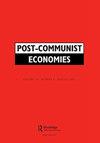苏联和后苏联国家的核供应链和环境正义斗争
IF 1.8
3区 经济学
Q2 ECONOMICS
引用次数: 11
摘要
摘要本文通过将苏联和后苏联背景下的核供应链社会环境冲突与核周边化和环境正义方法结合起来,探讨并促进了对这一问题的讨论。对《全球环境司法图集》中确定的14起案件进行了描述性统计和定性编码。1976年首次发现可见的抗议活动。所分析的案例包括整个核供应链;铀矿开采禁令、停止核反应堆和核试验禁令。其中七个冲突项目已被邻居、公民和社区、妇女、工业工人和土著群体暂停。然而,核项目仍然是与核废料和潜在核事故有关的持续关切问题。在存在核社会环境遗产和当前不公正现象的地区,核能统治所固有的军事暴力遭遇了反核抵抗。本文章由计算机程序翻译,如有差异,请以英文原文为准。
Nuclear supply chain and environmental justice struggles in Soviet and Post-Soviet countries
ABSTRACT This article addresses and contributes to the discussion on nuclear supply chain socio-environmental conflicts in Soviet and post-Soviet contexts by bringing it together with nuclear peripheralization and environmental justice approaches. Descriptive statistics and qualitative coding were applied to 14 cases identified in the Global Atlas of Environmental Justice. Visible protests were first detected in 1976. The cases analysed comprise the whole nuclear supply chain; uranium mining bans, stopping nuclear reactors, and nuclear testing bans. Seven of the conflictive projects have been suspended by neighbours, citizens and communities, women, industrial workers, and Indigenous groups. However, nuclear projects remain of ongoing concern related to nuclear waste and potential nuclear accidents. Military violence intrinsic to nuclear power domination encounters anti-nuclear resistance in areas where nuclear socio-environmental legacies and current injustices are lived.
求助全文
通过发布文献求助,成功后即可免费获取论文全文。
去求助
来源期刊

Post-Communist Economies
ECONOMICS-
CiteScore
4.90
自引率
18.20%
发文量
21
期刊介绍:
Post-Communist Economies publishes key research and policy articles in the analysis of post-communist economies. The basic transformation in the past two decades through stabilisation, liberalisation and privatisation has been completed in virtually all of the former communist countries, but despite the dramatic changes that have taken place, the post-communist economies still form a clearly identifiable group, distinguished by the impact of the years of communist rule. Post-communist economies still present distinctive problems that make them a particular focus of research.
 求助内容:
求助内容: 应助结果提醒方式:
应助结果提醒方式:


